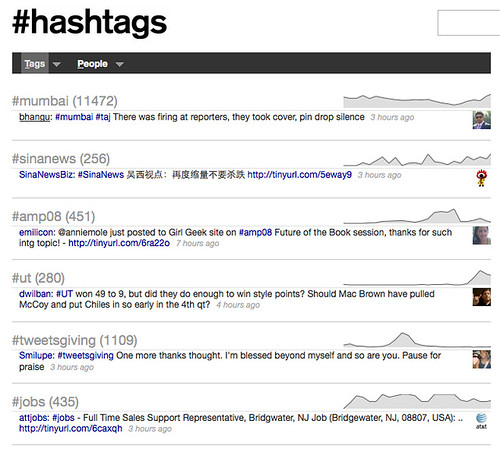What is a #HashTag?
A hashtag is this symbol: #. It is also a Twitter term that describes a keyword, prefixed by that symbol, that helps people track conversations on Twitter.
The HashTags site, a centralized directory of hashtags on Twitter, also offers a good definition:
A Brief History of Hash Tags
Chris Messina (@chrismessina) is credited with starting hashtags and has written about how to make them most useful. According to the Twitter Fan Wiki, hashtags were popularized during the San Diego forest fires in 2007 when Nate Ritter used the hashtag "#sandiegofire" to identify his updates related to the disaster.
Nonprofit Use #1: Events and Conferences
Since those early days, hashtags have been used in different ways by nonprofits. One of the most frequent applications has been to use them at events and conferences. It's not uncommon to see the "official" hashtag included with the promotional information about the event, even events or conferences that are not technology focused.
The hashtag creates a backchannel for participants. It also makes it easy for attendees to follow the conversation thread and participate whether they are or in the room or following from afar. That's, of course, if the tag used is unique enough.
Nonprofit Use #2: Sharing Knowledge/Resources As Community of Practice
Hashtags can create an ad hoc community of practice or a channel for people in a field to informally share resources or conversation.
Tagging communities or unbounded networks that might come to life around a tag are not new. The Nonprofit Technology community has used a special tag, nptech, created by Marnie Webb in 2004. It still continues to be used on Twitter as well as other places. Although this was before Twitter, the advice about what makes an effective tagging community still resonates and are applicable to effective Twitter hashtags
There are many adhoc Twitter hashtags where nonprofits, foundations, social entrepeneurs, and others are sharing resources or having conversations. Some occur on a regular basis I don't think there is a formal directory of nonprofit hashtags, but there are few terrific blog posts that have good lists. For example, Socialedge compiled a list of Twitter users in the social entrepreneurship sector that included a list of hashtags.
Given that hashtags seem to appear and disappear like cheshire cats and most seem ephemeral, a massive directory of hashtags for nonprofits is probably not very useful. However, a list of the ten best hashtag communities and conversations might be.
Some of the #hashtag communities are ongoing and unstructured like the #nptech tag community. Others are more formal, structured conversations that happen weekly at a particular time. #4change is a regular chat about social media change. Another example, although not totally nonprofit focused is #blogchat. #blogchat which is facilitated by @mackcollier and uses wthashtag to aggregate the conversation.
In my initial analysis of mega list of 90 Foundations that Tweet, I did not look at hashtags. Nathaniel Naskashima, in a comment on another post, shared some insights from his look at the hashtags used by Foundations on Twitter. He observes that the hashtags are general, not unique.
I think it takes more a unique tag. You need to publicize the tag and encourage conversation around the tag. Also, having weekly summaries that can be shared in other mediums can make the information accessible to others who don't want to participate on Twitter. For example, the #givelist tag aggregated all the suggestions from Twitter and then created this site. This takes some facilitation.
Nonprofit Use #3: Advocacy Channel
Hashtags can be used effectively at different rungs on the ladder of engagement. The best example of educating and engaging is how the National Wildlife Federation is using the #nwf hashtag to engage its audience in watching wildlife.
Another example is their use in a policy debate. EDF has put together a Twitter Guide to the Climate Bill Discussion. The guide points out the hashtags used by people who are supporting the bill or against. It also provides some "tweeting" points for advocates to use. And, in the case of Twitter Vote Report Twitter hashtags have been used for real-time participatory democracy.
- What other uses of hashtags by nonprofits are there?
- What are the lessons learned for using them effectively?
- What are your best resources about hashtags?






Discovering - and using - the hashtags that are being used by your opposition can be an excellent way to spread information to potentially moveable audiences. It can also be a handy way to drown out the opposition, if that's your goal. Groups working on climate issues are actively watching, and using, the hashtags created by climate-deniers. We find them about as quickly as they are created, and are quickly able to mobilize our community to tweet corrections to misinformation campaigns, and direct tweeters to online resources for nonpartisan studies and scientific information.
Posted by: Cat Lazaroff | August 21, 2009 at 09:17 AM
When I created a Twitter profile for Cross-Cultural Solutions late last year (@volunteerabroad), naturally the first thing I did was look for content on Twitter related to our sector, volunteering abroad. Through keyword searches ("volunteer abroad," of course, and "international volunteer," "voluntourism," and others), I found people who were chatting about their interest in volunteering abroad -- which is great when it comes to discovering and engaging prospective volunteers -- but, interestingly, I had a lot of trouble find peer organizations and others in our sector who were tweeting the content I was looking for. Or, I found people/orgs who sometimes tweet about volunteering abroad, but not consistently enough for me to be interested in following them.
I perceived a need for people, companies, and organizations involved in the sector to share content specifically related to volunteering abroad in a way that made it easily discoverable. There were already lots of great examples where Twitter users were using hashtags to aggregate tweets around a particular topic, so why shouldn't there be one for tweets about volunteering abroad?
So, #volabroad was born as an experiment to find out if other people and orgs also perceived a similar need. We used for many months before it gained traction, but now there seem to be about a dozen or so Twitter users who are using it on a regular basis to tag content about volunteering abroad...and it's helpful stuff, too! :)
Posted by: Matt Koltermann | August 21, 2009 at 12:26 PM
There are issue area and regional tags, even business model tags, which, especially in combination with one other tag, can be quite useful.
For example, popular issues include:
#microfinance #hiv #water
And examples of regional tags include continents, countries, regions
#Africa #Kenya #mideast or #middleast (there is not always consensus)
Business models:
#SocEnt (social entrepreneurship) #nonprofit #socialenterprise #volunteering
Combined, for example, you might find #water and #africa useful:
http://search.twitter.com/search?q=%23water+%23africa
But trying to get more specific and use more than two tags in search is unlikely to deliver results - people will run out of room for their actual tweet.
Cheers, Jill aka @socialedge
Posted by: Jill Finlayson | August 21, 2009 at 04:35 PM
This is a GREAT post, Beth! I used hashtags for a recent panel at Netroots Nation: #nn09 & #StepUp to crowdsource notetaking and also getting our issue into the sights of the larger conference. I wrote about the strategy here.
I'm wondering if you know what to do when your tweets stop showing up in hashtag searches. It's been happening to me for the past 2 weeks and I've resorted to using other accounts. Apparently "a href="http://getsatisfaction.com/twitter/topics/my_hashes_and_my_tweets_dont_appear?utm_content=topic_link&utm_medium=email&utm_source=reply_notification">I'm not alone but no one knows how to fix the problem.
Posted by: Will Coley | August 22, 2009 at 04:20 PM
Corrected link from above re: Twitter search problem: Apparently I'm not alone but no one knows how to fix the problem.
Posted by: Will Coley | August 22, 2009 at 04:21 PM
Hey Beth, just posted on my blog about how we made our Taking Action for Animals conference "socially-enabled" and touched alot on Twitter and hashtags.
http://cariegrls.blogspot.com/2009/08/creating-socially-enabled-non-techie.html
Posted by: Carie Lewis | August 23, 2009 at 08:32 PM
Thanks Beth. It seems to me that hash tags work best when they are used as abbreviations for phrases that are too long to use with twitter such as #volabroad or #NWF or a way of artificially creating a discussion community such as #4change. Since there are so many ways of searching twitter, I don't understand the advantage of using the hashtag next to short words such as HIV or Africa. For our work on the Haitian-Dominican border, I get far more results when I search for "Haiti" rather than "#Haiti". What do you think?
Posted by: Daniel O'Neil | August 24, 2009 at 08:19 AM
A number of us interested in a new era of Jewish education have been using #JEd21 (Jewish education in the 21st century) over the past several weeks. The discussion has moved forward at a surprising rate, and is engaging more and more people as the first 8-10 core participants added #JED21 to so many of their tweets that it inspired others to check it out. We've blazed through topics, and are now seeking ways to bring this group together for a longer format discussion and possible action in the community. A number of participants have blogged about it on their own sites. It's been really fun to be part of a vibrant conversation, and 140 limit has actually helped us, since few of us would keep up as actively on a longer format listserv or blog.
Posted by: Lisa Colton | August 25, 2009 at 04:06 PM
In response to Dan's question, adding a hash mark (#) preceding a word in your tweet automatically turns that word into a hashtag, and that hashtag into a hyperlink. Anyone reading the tweet on the Twitter website (and in some Twitter apps) just has to click on the hashtag to pull up a search for that term, which makes it easier to see the rest of the conversation around that topic.
My nonprofit works to advance women in technology fields. Each of our events has a hashtag that our staff and attendees use before, during and afterwards to spread information, connect with participants, and share learnings and experiences. It draws attention to the value of our work and also shares some of that value with those who can't attend. I also actively use and promote the #women2follow tag on Wednesdays (and, I admit, on #followfriday as well) to help help counter the documented tendency for most twitterers to follow more men than women.
Posted by: BJ Wishinsky | August 25, 2009 at 08:28 PM
Beth, I found out how to resolve problems with lost tweets in hashtag searches on Twitter (i.e. as discussed on Get Satisfaction):
Fill out a problem report here: http://twitter.zendesk.com/requests/new
AND send a tweet to @Lukester.
They resolved it in a hour.
Posted by: Will Coley | August 31, 2009 at 01:02 PM
Thanks for the article Beth. I'm researching how to integrate twitter into a donation/event organization website and your post really helped. I think using hashtags for organizing events could be very helpful, moreso than using them for an overall issue. Having the event organizer post on their blog a message which includes a specific hashtag, combined with a retweet button could be very powerful for disseminating information to participants..
Posted by: Patrick Byrd | September 29, 2009 at 08:58 AM